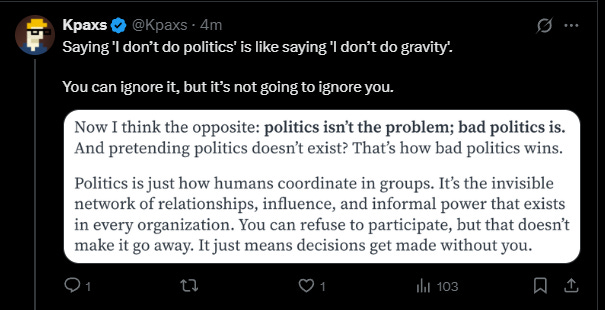The Death of Politics
Civilization is the slow conversion of coercion into coordination.
Kpaxs suggests: “Saying ‘I don’t do politics’ is like saying ‘I don’t do gravity.’ You can ignore it, but it’s not going to ignore you.”
It’s clever. But it’s also wrong.
This line trades on an equivocation — a linguistic sleight of hand that makes cynicism sound like realism. The trick lies in redefining politics from its proper meaning — the struggle over coercive power — into a catch-all term for any kind of human coordination.
Once you equate politics with coordination, the statement becomes tautological: of course you can’t avoid politics if every social interaction counts as politics. But that’s a rhetorical illusion, not a philosophical truth.
1. Politics vs. Coordination
Politics, properly defined, is about who gets to use coercion — who can compel others, enforce rules, and wield authority. Coordination, by contrast, is about voluntary alignment — how agents cooperate toward shared or compatible goals.
Conflating these erases the crucial moral boundary between voluntary association and imposed hierarchy. It’s like saying “all motion is gravity” — poetically appealing, but analytically useless.
2. The Smuggling of Coercion
By calling all coordination political, the author normalizes coercion. The statement hides the unique moral danger of politics: that it authorizes some people to rule others. When you accept that everything is politics, you accept domination as inevitable — and worse, as natural.
That’s how power maintains itself: by convincing the governed that participation is the only moral stance. “You can’t avoid politics” becomes code for “you can’t avoid being ruled.”
3. The False Dichotomy
The author frames the issue as good politics vs. bad politics, implying that politics itself is neutral — only its practice corrupts. But this misses the structural point: politics, as coercive coordination, incentivizes corruption. It’s not an aberration; it’s an attractor.
Saying we just need better politics is like saying we just need better parasites. You don’t optimize domination; you minimize its scope.
4. Is Politics Inevitable?
Politics feels universal because it emerges so reliably — but that doesn’t make it inevitable. It appears whenever three conditions align: shared resources, information asymmetry, and enforceable leverage. Wherever those exist, manipulating power becomes a rational strategy.
Politics is not a law of nature but an equilibrium: an emergent behavior of agents gaming imperfect coordination systems. Remove or neutralize the asymmetries that reward manipulation, and political behavior collapses. Perfect symmetry would eliminate politics entirely; real-world institutions can only approximate it. Markets, open protocols, and scientific peer review are precisely those approximations — structures that shrink the ecological niche where politics can thrive.
Politics is not gravity. It’s what gravity would look like if it evolved incentives — a recurring attractor, not a universal constant.
5. The Alternative
Markets, science, and open protocols are anti-political systems — decentralized mechanisms of order that reduce the need for coercion. They work precisely because they substitute rules of voluntary cooperation for politics-as-power.
Refusing to “do politics” isn’t denying reality; it’s rejecting a rigged game. It’s an act of moral and intellectual hygiene.
Politics isn’t gravity. It’s an exploit. Ignore it, and it quietly compromises the system. Engage it, and it escalates until it consumes your resources. Civilization is the long process of replacing politics with protocols. Every genuine advance — from markets to constitutions to code — reduces the surface area where coercive power can hide.



